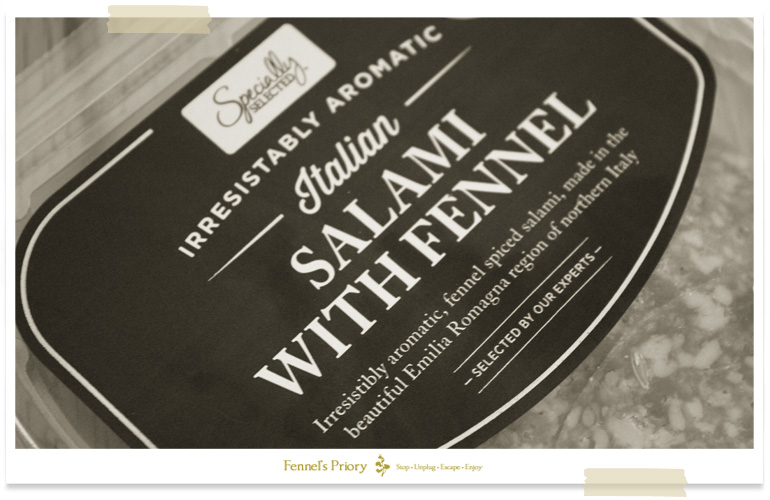What's in a Name?
Becoming Fennel
Of course, Fennel isn't his real name. It's Nigel. But Fennel is what his friends call him, and what he much prefers. Hence why he uses it as his pen name.
For the full story, watch the video above.
The nickname 'Fennel' arose in 1995 following an all-too-unfortunate accident with a bucket of fishing bait. Nigel had been invited to join the mega-exclusive Jade Lake fishing syndicate in Wiltshire (read about his adventures in Wild Carp, Fennel's Journal No. 4), where Chris Yates had written The Secret Carp. After asking around, Nigel discovered that fennel was the 'in flavour' with which to enhance one's fishing bait. So, as a gardener with a near-limitless supply of the herb, he set about gathering barrow-loads of fennel from his herb garden. He then mashed it up with his hands and plunged it into the hot water in which he soaked his fishing bait.
Twelve months later, and after catching very few fish, Nigel was invited to join Chris Yates' Golden Scale Club. As part of the inauguration ceremony, Nigel would be asked to give his 'club name' by which he would henceforth be known. And to mark the occasion he would be presented with a matching pair of split cane bamboo rods onto which would be inscribed his new name and the club motto 'Casus Ubique Valet' ('There's always a chance').
Shaun Linsley, himself a Jade Lake member, was tasked with making the rods. "So what name do you want?" he asked. "Absolutely no idea," replied Fennel. "Isn't it obvious?" said Shaun. "Just use the name that everyone's calling you at Jade."
Shaun then explained that everyone Nigel had shaken hands with later complained of being unable to remove the fennel smell from their hands:
"Have you met that new member?" they'd say. "Chris Yates' protege – the one with 'very' green fingers."
And so the name quite literally stuck. It was inscribed onto the rods and written into the Golden Scale Club book. Nigel became Fennel, and he's been using the name ever since.
But the funny thing was that nobody else fishing at Jade was using fennel plants as flavouring. They were using fennel essential oil dispensed from a pipette. So if Nigel wasn't a gardener, he'd never have become Fennel.

The birth of Fennel's Priory
The name 'Fennel's Priory' was bestowed in 1996, when author and artist Bernard Venables told Fennel that he should stop using the title "Fennel's Ginger Beer and Wine Gum Factory" on his letterheads.
"Your letters are too well written to carry such a ludicrous heading," said Bernard. "I suggest you use something that has greater meaning, a word that matches the sentiments and reflective nature of your letters. You should consider the name 'Fennel's Priory'. A priory is a place of reverence and quiet reflection. It would be most suited to your writing."
And so Fennel's letterheads were changed, and Fennel's Priory became associated with the escapism and quiet places discussed in his writing.
It was only after Bernard Venables' death in 2001 that Fennel appreciated the significance of the word 'priory'. Bernard was his mentor and counsel. In monastic terms, this made him the 'abbot'. A priory is a satellite of an abbey, meaning that Fennel's Priory is an offshoot of the church of Bernard Venables. Quite something given that Bernard was not religious, but meaningful in its purpose. Hence why, when fennelspriory.com was launched in 2011, it led with Bernard's message from the first edition of his Creel magazine from 1964:
"Our times are strange times, with a sort of fever on them. Men, who should have their feet on living soil, are shut up in sky-offending towers of flats; great towns sprawl and breathe foul fumes, not air. Crafts die and machines are master; cold plastic replaces the honesty and nature of wood. We, citizens of the chemists' era, must search with a kind of panic for those rooting tendrils that should unite us to our true origins."
And so Fennel's Priory took up the challenge of searching for the tendrils that unite us to our origins. This purpose remains today. It seeks to bring greater meaning to our lives by helping us to understand our true self, placing ourselves firmly as children of nature by celebrating rural escapism and a slow pace of life. It's freedom – from the noise and stresses of modern life.
If you like the work of lifestyle and countryside author Fennel Hudson, then please subscribe to Fennel on Friday. You'll receive a blog, video or podcast sent direct to your email inbox in time for the weekend.



